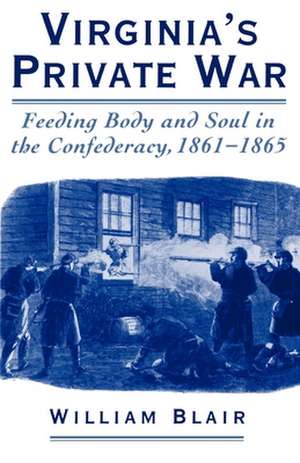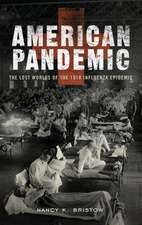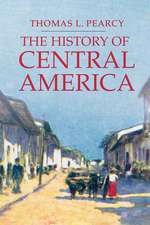Virginia's Private War: Feeding Body and Soul in the Confederacy, 1861-1865
Autor William Blairen Limba Engleză Paperback – 5 oct 2000
| Toate formatele și edițiile | Preț | Express |
|---|---|---|
| Paperback (1) | 250.41 lei 31-37 zile | |
| Oxford University Press – 5 oct 2000 | 250.41 lei 31-37 zile | |
| Hardback (1) | 502.87 lei 31-37 zile | |
| Oxford University Press – 17 dec 1998 | 502.87 lei 31-37 zile |
Preț: 250.41 lei
Preț vechi: 279.42 lei
-10% Nou
Puncte Express: 376
Preț estimativ în valută:
47.91€ • 50.03$ • 39.57£
47.91€ • 50.03$ • 39.57£
Carte tipărită la comandă
Livrare economică 04-10 aprilie
Preluare comenzi: 021 569.72.76
Specificații
ISBN-13: 9780195140477
ISBN-10: 0195140478
Pagini: 216
Ilustrații: 2 maps
Dimensiuni: 136 x 208 x 16 mm
Greutate: 0.28 kg
Ediția:Revised
Editura: Oxford University Press
Colecția OUP USA
Locul publicării:New York, United States
ISBN-10: 0195140478
Pagini: 216
Ilustrații: 2 maps
Dimensiuni: 136 x 208 x 16 mm
Greutate: 0.28 kg
Ediția:Revised
Editura: Oxford University Press
Colecția OUP USA
Locul publicării:New York, United States
Recenzii
"Recipient of the Nevins Prize for dissertations, this compact work re-examines whether domestic strife led to the Confederacy's defeat. By focusing on a single state, William Blair provides a perspective that broader national studies have been unable to achieve....Blair's provocative interpretation about the role civilians played in the war's outcome will interest both scholars and students of this era."--Civil War History
"Well researched, readable, and highly interpretative. Recommended for both academic and larger public libraries."--Library Journal
"Bill Blair has made an important addition to the growing literature on the home front in the Civil War, which adds a crucial dimension to our understanding of that conflict. He demonstrates that, whatever their opinion of the Confederate government and its measures, most Virginians remained loyal to the cause of Southern independence to the bitter end. Instead of sapping the will to win, as some scholars have maintained, white civilians helped to sustain army morale. In Virginia the Confederate cause did not collapse internally; it was crushed externally by a determined enemy."--James M. McPherson, Princeton University
"One of the most important studies of any state in the Confederacy and one of the most important and innovative books on the Civil War published in the past decade. William Blair shifts the focus on Confederate political leadership from the national to the state and local levels and finds that the Confederacy was far more flexible than is usually suggested and far more responsive to the demands of its citizens." --Reid Mitchell in The Virginia Magazine
"Virginia's Private War is a work of creative research, brilliant analysis, and breathtaking originality. Blair has explored the forging of Confederate identity at the local and state levels more thoroughly and perceptively than any previous scholar. There is fresh information and insight on nearly every page. Facile generalizations about such familiar topics as 'loss of will' fall right and left. This is far and away the best study ever done of a southern state during the Civil War."--George C. Rable, University of Alabama
"Engagingly written, meticulously researched, and thoughtfully argued, Virginia's Private War offers an important and fresh contribution to our understanding of the Civil War. Bill Blair's thorough and sensitive account of the ways in which different groups of Virginians responded to secession, war, and defeat develops a complex and nuanced argument that simultaneously acknowledges the issues that divided Virginians and those that unified them. Virginia's Private War will appeal to all who are interested in the Civil War, whether general readers or specialists, and will reward its readers with a compelling picture of the ways in which a diverse--and often internally divided--society responded to the social, political, and military challenges that the war provoked."--Elizabeth Fox-Genovese, Emory University
"Well-researched and lucidly written, this is a valuable study of the Virginia home front with implications that reach beyond the Old Dominion state. Offering an articulate, nuanced challenge to the common picture of a Confederate South riven by internal division, it portrays instead the remarkable resilience of Virginians in the face of a harsh struggle for survival."--Mark Grimsley, The Ohio State University
"William Blair's book recasts our understanding of the Confederate home front. His innovative research and subtle interpretation reveal new meanings of the American Civil War."--Edward L. Ayers, University of Virginia
"Blair holds a mirror up to the grim realities Virginians faced as their state absorbed the shock of invading Union armies. He provides a solid and readable contribution to accounts of that troubled period in our history."--Virginian-Pilot
"This book should find a receptive audience far beyond the boundaries of Virginia."--News and Record
"...this is the best work on the Confederate home front to date. It should appeal to a wide readership, from scholars to the general public."--Choice
"William Blair's Virginia's Private War must surely rank among the best studies of a Confederate state at war. He presents a complex and multifaceted picture of the stresses and strains of a society very much in the front line, and of the discontents, shortages and sufferings which many of its people endured."--Times Literary Supplement
"...Blair has done a fine job of research and devoted careful thought to this book....Virginia's Private War is a detailed, highly sophisticated, and intellectually challenging work that sheds a new light on the Confederate home front and should spark much worthwhile thought, research, and debate in the years to come."--Columbiad
"Well researched, readable, and highly interpretative. Recommended for both academic and larger public libraries."--Library Journal
"Bill Blair has made an important addition to the growing literature on the home front in the Civil War, which adds a crucial dimension to our understanding of that conflict. He demonstrates that, whatever their opinion of the Confederate government and its measures, most Virginians remained loyal to the cause of Southern independence to the bitter end. Instead of sapping the will to win, as some scholars have maintained, white civilians helped to sustain army morale. In Virginia the Confederate cause did not collapse internally; it was crushed externally by a determined enemy."--James M. McPherson, Princeton University
"One of the most important studies of any state in the Confederacy and one of the most important and innovative books on the Civil War published in the past decade. William Blair shifts the focus on Confederate political leadership from the national to the state and local levels and finds that the Confederacy was far more flexible than is usually suggested and far more responsive to the demands of its citizens." --Reid Mitchell in The Virginia Magazine
"Virginia's Private War is a work of creative research, brilliant analysis, and breathtaking originality. Blair has explored the forging of Confederate identity at the local and state levels more thoroughly and perceptively than any previous scholar. There is fresh information and insight on nearly every page. Facile generalizations about such familiar topics as 'loss of will' fall right and left. This is far and away the best study ever done of a southern state during the Civil War."--George C. Rable, University of Alabama
"Engagingly written, meticulously researched, and thoughtfully argued, Virginia's Private War offers an important and fresh contribution to our understanding of the Civil War. Bill Blair's thorough and sensitive account of the ways in which different groups of Virginians responded to secession, war, and defeat develops a complex and nuanced argument that simultaneously acknowledges the issues that divided Virginians and those that unified them. Virginia's Private War will appeal to all who are interested in the Civil War, whether general readers or specialists, and will reward its readers with a compelling picture of the ways in which a diverse--and often internally divided--society responded to the social, political, and military challenges that the war provoked."--Elizabeth Fox-Genovese, Emory University
"Well-researched and lucidly written, this is a valuable study of the Virginia home front with implications that reach beyond the Old Dominion state. Offering an articulate, nuanced challenge to the common picture of a Confederate South riven by internal division, it portrays instead the remarkable resilience of Virginians in the face of a harsh struggle for survival."--Mark Grimsley, The Ohio State University
"William Blair's book recasts our understanding of the Confederate home front. His innovative research and subtle interpretation reveal new meanings of the American Civil War."--Edward L. Ayers, University of Virginia
"Blair holds a mirror up to the grim realities Virginians faced as their state absorbed the shock of invading Union armies. He provides a solid and readable contribution to accounts of that troubled period in our history."--Virginian-Pilot
"This book should find a receptive audience far beyond the boundaries of Virginia."--News and Record
"...this is the best work on the Confederate home front to date. It should appeal to a wide readership, from scholars to the general public."--Choice
"William Blair's Virginia's Private War must surely rank among the best studies of a Confederate state at war. He presents a complex and multifaceted picture of the stresses and strains of a society very much in the front line, and of the discontents, shortages and sufferings which many of its people endured."--Times Literary Supplement
"...Blair has done a fine job of research and devoted careful thought to this book....Virginia's Private War is a detailed, highly sophisticated, and intellectually challenging work that sheds a new light on the Confederate home front and should spark much worthwhile thought, research, and debate in the years to come."--Columbiad
Notă biografică
Formerly Assistant Professor of United States History at the University of North Carolina at Greensboro, William Blair is now Associate Professor at Pennsylvania State University, where he is also the Director of the Civil War Era Institute. He won the 1996 Allan Nevins Prize (given by the American Society of Historians for the best American History dissertation) and served as the co-editor of A Politician Goes to War: The Civil War Letters of John White Geary (1995).












